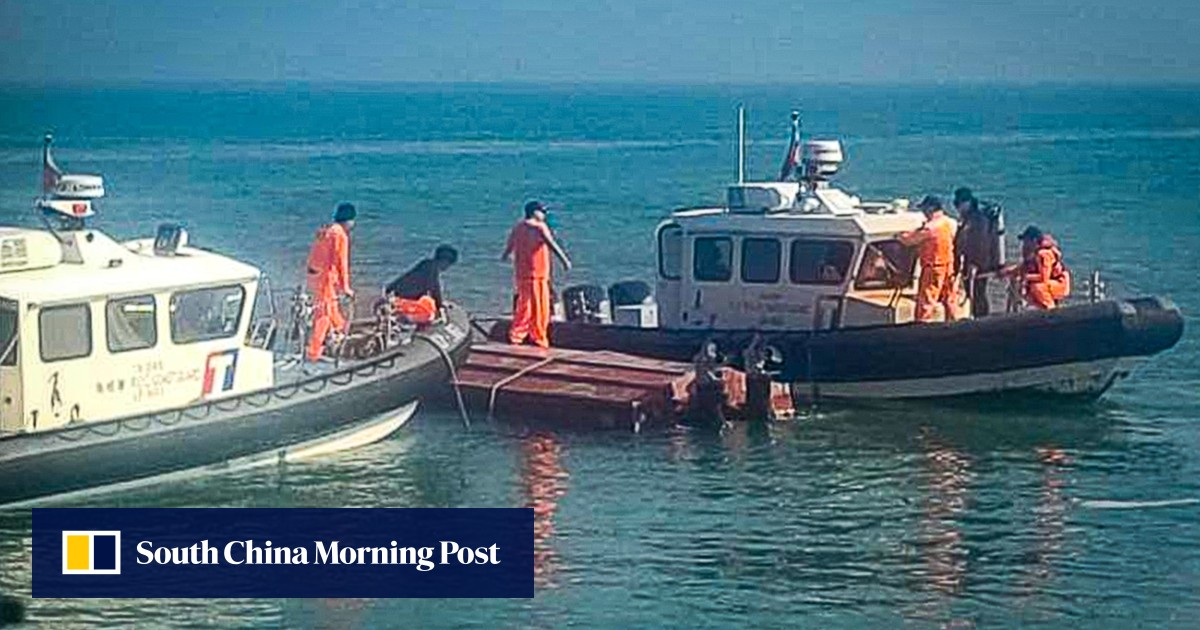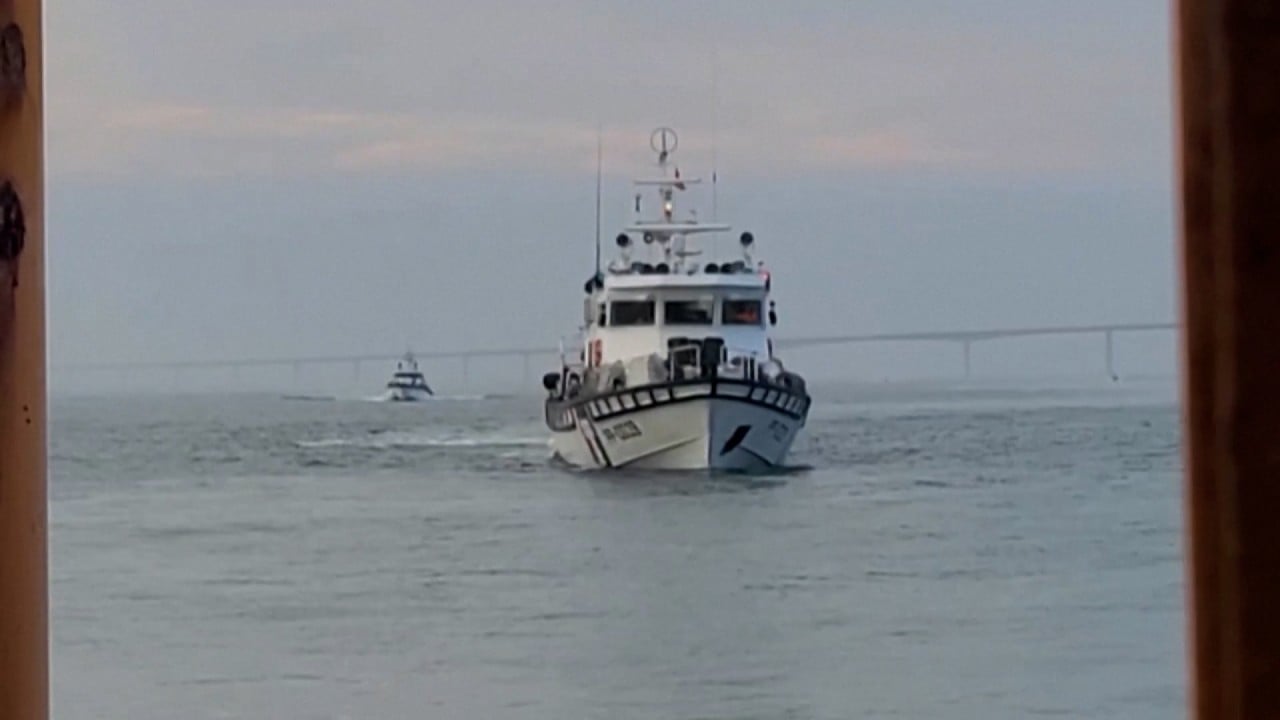The group, which also included six bereaved family members, a lawyer and two local Red Cross officials, organised the passage of the two survivors back to Quanzhou on the same day.
The retrieval went without incident, raising the possibility for further, much-needed official contact and crisis management between the two sides, according to some analysts.
2 mainland Chinese fishermen return home after fatal Taiwanese coastguard chase
2 mainland Chinese fishermen return home after fatal Taiwanese coastguard chase
Quemoy – a Taiwanese defence outpost also known as Kinmen – is just a few nautical miles from the mainland city of Xiamen, and the deaths escalated already heightened tensions across the strait.
“Disputes over seabed sand [extraction], fishing and other suspicious activities by unregistered mainland boats near Taiwan’s offshore islands have been a constant headache for the [Taiwanese] government and local people,” said Alexander Huang Chieh-cheng, a professor of international affairs and strategic studies at Tamkang University in New Taipei.
“Without official dialogue across the strait, the international community should buckle up for future unintended incidents.”
Beijing vows regular patrols in waters where 2 fishermen died after Taiwan chase
Beijing vows regular patrols in waters where 2 fishermen died after Taiwan chase
Tsai will step down as the island’s leader in May when she ends her second and final four-year term. She will be succeeded by Vice-President William Lai Ching-te, who won an election in January.
Lai is regarded by Beijing as an “obstinate separatist” whose leadership would bring war to Taiwan.
Observers noted that it was a very different situation from 2008-2016 when Ma Ying-jeou of the mainland-friendly Kuomintang was president. Then, Beijing chose to maintain an amicable relationship with Taipei.

“Beijing has observed Taiwan’s unilateral definition of restricted and prohibited waters for all offshore islands, but never recognised them,” Huang said, adding that the boat tragedy gave the mainland “a perfect excuse” to openly deny Taiwan’s restricted zones and jurisdictions.
But, Huang said, it should be seen as a one-off case.
“From a larger picture, it’s not in the interests of Beijing and Taipei to allow cross-strait relations to be the hostage of an unexpected incident of this kind of scale,” Huang said. “Escalations by either side would be extremely unwise.”
The growing tensions have prompted Washington to call for the maintenance of peace and stability across the Taiwan Strait.
The US State Department said on Tuesday that Washington was closely monitoring Beijing’s actions, while continuing to “urge restraint and no unilateral change to the status quo”.
“I’d say that ‘sincere apology’ – not ‘regret’ – from high-level officials is necessary to ease the tension. After all, the prosecutors have already found inappropriate manoeuvres in Taiwan coastguard’s hard pursuit,” he said.
We can use this opportunity … to establish an interactive channel with the mainland for the future handling of issues, including humanitarian assistance and law enforcement
Ying-yu Lin, a professor of international relations and strategic studies also at Tamkang University, said the crisis could be viewed as a “turning point” as the island could use this opportunity to set up an “interactive channel” with the mainland.
“Beijing has announced it would ‘normalise’ its patrol operations around Taiwan. We can use this opportunity, with the law-enforcing units of our coastguard as the side to establish an interactive channel with the mainland for the future handling of issues, including humanitarian assistance and law enforcement,” Lin said.
“This could create the chance of official interactions and crisis management between the two sides in the future.”
“This is something the authorities must take note of,” he said.
Zivon Wang, an analyst at the Chinese Council of Advanced Policy Studies, a Taipei-based think tank, said he believed the two sides still maintained certain contact channels to deal with practical issues like crime, sea rescues and other humanitarian matters, though such contacts had become less active over the past eight years.
“The boat incident should allow Taiwan and the mainland to warm up their contacts, but I am not optimistic that the two sides could be able to return to official interactions merely through the increase in local-level official contacts,” Wang said.
“With Beijing standing firm on its staunch opposition to Taiwan independence, the chance of a cross-strait reconciliation is almost zero.”
He said the recent moves by the mainland to try to restrict the island’s air space and waters were meant as a pressure campaign against Lai ahead of his inauguration on May 20.
Meanwhile, one of the two survivors who returned to Quanzhou told mainland media on Tuesday that there was no way their speedboat could have flipped on its own, even when it was making sharp turns during the chase.
“It flipped only because of the strong impact [by the coastguard vessel],” the survivor said, adding the men “fell overboard because of the impact and only two made it to the shore”.
On Thursday, the island’s coastguard admitted a collision had occurred.
“The stern of the mainland speedboat hit the starboard of the [coastguard] CP-105 vessel when it made a sharp turn to the right during the one-minute chase,” Taiwan coastguard spokesman Chen Chien-wen said. “It bounced and flipped due to centrifugal force.”
He said two of the four men quickly swam up by themselves, a third, who was found floating in the water, was unconscious, and the last, who was trapped in the boat’s cabin, showed no signs of life after he was pulled out.
The Kinmen prosecutor’s office said on Thursday that while one survivor told the office there was a collision during the chase, the other one said he “did not feel the impact because the boat was running at high speed”.
The incident raised concerns over whether the coastguard had employed excessive force. Opposition lawmakers also questioned why the officers decided to order the speedboat crew for inspection, instead of dispersing the boat as in various previous cases.








